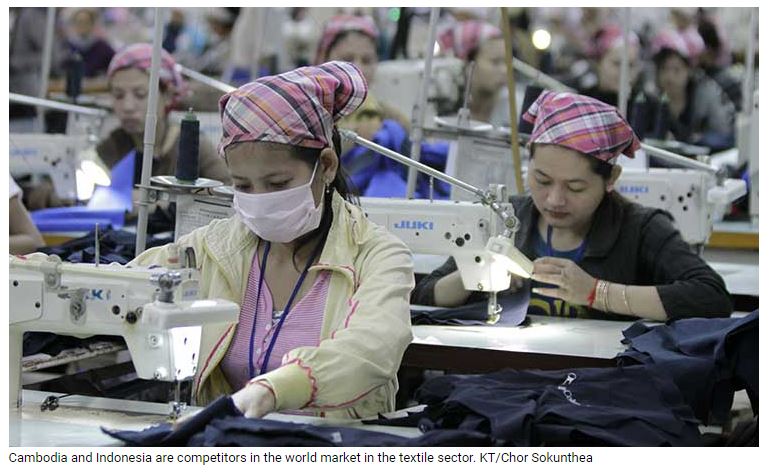RCEP unlikely to lift Cambodia-Indonesia textile trade
The trade ties between Indonesia, which became the latest member to join the Regional Comprehensive Economic Partnership (RCEP), and Cambodia are expected to go up, but the textile sector in both countries is unlikely to benefit from the agreement, according to some experts.
The RCEP Agreement entered into force for Indonesia on 2 January. Indonesia is the largest economy in ASEAN and the fifth largest among the RCEP countries. Its economy registered a 3.7 percent growth in 2021 to $1.186 trillion. According to World Bank estimates, Indonesia was set to grow by 5.2 percent in 2022 and 4.8 percent this year.
Experts point out that Cambodia and Indonesia are competitors in the world market in the textile sector and their current bilateral trade in apparel, fabrics and yarn is limited.
According to Fibre2Fashion’s market insight tool TexPro, Cambodia’s apparel exports to Indonesia were worth $22.292 million in 2019. However, it fell to $14.156 million in 2020 due to the Covid-19 pandemic. The shipment increased to $16.144 million in 2021 and amounted to $14.781 million in the first ten months of 2022.
Experts observed that the exports in the full year 2022 might surpass the figures of 2021 but may not reach the pre-Covid levels.
They pointed out that Cambodia’s apparel imports from Indonesia were negligible.
Cambodia’s home textile exports to Indonesia jumped to $2.086 million in 2020
but ended up being negligible in 2021 and 2022. Its import of home textiles from Indonesia was also insignificant, as per TexPro.
In textile trade, the Kingdom’s export of fabric to Indonesia increased in recent years and hit $9.998 million in the first ten months of 2022 as against $7.329 million in 2021 and $2.575 million in 2020.
Fabric imports from Indonesia to Cambodia were valued at $11.308 million in 2020 but dropped to $7.864 million in 2021. It fell to $3.976 million in the first ten months of 2022.
The yarn imports from Indonesia to Cambodia also showed a decline in recent years, according to reports.
However, trade ties between Cambodia and Indonesia are expected to rise further and cross $1 billion this year.
According to reports from the General Department of Customs and Excise (GDCE), the trade volume between Cambodia and Indonesia surged 46.4 percent to about $629 million in January-September 2022, from $417 million in the same period of 2021.
Cambodia exported $5.6 billion worth of goods to the RCEP member countries in eleven months of last year, an increase of five percent compared to the same period last year, data from the Ministry of Commerce showed.
Regarding the country’s entry into RCEP, Indonesian Minister of Trade Zulkifli Hasan was quoted in a statement that the agreement is expected to increase competitiveness and strengthen global production network, promote regional supply chain through better market access for exports of goods and services, reduce or eliminate trade barriers, and enhance transfer of technology.
Meanwhile, Satvinder Singh, Deputy Secretary-General for the ASEAN Economic Community, told Asean.org website: “The entry into force of the RCEP Agreement on 2 January 2023 is timely to mark the beginning of Indonesia’s ASEAN Chairmanship in 2023. Indonesia has been the driving force in RCEP since the conceptualisation phase, and we hope more milestones, such as the establishment of the RCEP Support Unit, can be achieved during Indonesia’s ASEAN Chairmanship this year.”
The RCEP Agreement was signed on 15 November 2020 by 15 countries including the 10 ASEAN Member States, Australia, China, Japan, Korea, and New Zealand.
The RCEP Agreement entered into force on 1 January 2022 for Brunei Darussalam, Cambodia, Lao PDR, Singapore, Thailand, Viet Nam, Australia, China, Japan, and New Zealand; on 1 February 2022 for Korea; and on 18 March 2022 for Malaysia.
Source: https://www.khmertimeskh.com/501216668/rcep-unlikely-to-lift-cambodia-indonesia-textile-trade/


 English
English




